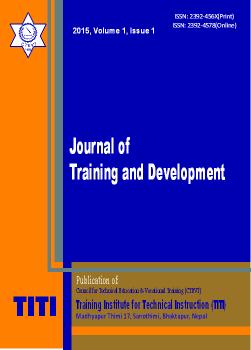Short Term Vocational Skill Test in Nepalese Context
DOI:
https://doi.org/10.3126/jtd.v1i0.13091Keywords:
Vocational skill test, human capital, remittanceAbstract
This paper assesses the possible contribution of short term vocational skill tested graduates and labour migration in foreign employment and remittances to Nepalese economy. An attempt has also been made to assess the role of effective skill testing system that can be provided even in local level as for equal accessibility to all skilled workforces throughout the country. Producing skill tested graduates is known to be a process of human capital formation that is equally benefitted to self and society. Due to easy access of government policy, Nepalese youths are working in international labour market and at a time when the country's major economic indicators are not favorable, the remittances have played a vital role in national economic growth. Though remittances earning is a boon to the economy, the facilities are inadequate to back up the increasing trend of migration. Inadequate knowledge on skill testing system and lack of skill training and poor opportunities to involve in trade specific work are some of bottlenecks to Nepalese youths. This paper suggests that formulation and effective implementation of short term vocational skill testing system in local level is the need of today so that most of foreign labour migrants can grab semi-skilled employment opportunities through specific vocational skill tested certification. The government needs to play a proactive role to promote foreign employment by inducting and adhering to the policy of socio-economic development and human capital formation. Replicating the status and impact of short term vocational skill tested graduates and migrated labour in foreign employment, state mechanism has to be endorsed in our national context for development and promotion of skill testing mechanism in local level and regularization of foreign employment. In such a situation, majority of youths could get opportunities to take skill tested certificate that can encourage them to become a vocational skill and trade occupation specific. Such types of work specification could ultimately increase working efficiency and productivity of each workforce and economic prosperity of the country.
DOI: http://dx.doi.org/10.3126/jtd.v1i0.13091
Journal of Training and Development Vol.1 2015: 54-61
Downloads
Downloads
Published
How to Cite
Issue
Section
License
Authors who publish with this journal agree to the following terms:
- Authors retain copyright and grant the journal right of first publication with the work simultaneously licensed under a Creative Commons Attribution License that allows others to share the work with an acknowledgement of the work's authorship and initial publication in this journal.
- Authors are able to enter into separate, additional contractual arrangements for the non-exclusive distribution of the journal's published version of the work (e.g., post it to an institutional repository or publish it in a book), with an acknowledgement of its initial publication in this journal.
- Authors are permitted and encouraged to post their work online (e.g., in institutional repositories or on their website) prior to and during the submission process, as it can lead to productive exchanges, as well as earlier and greater citation of published work (See The Effect of Open Access).




